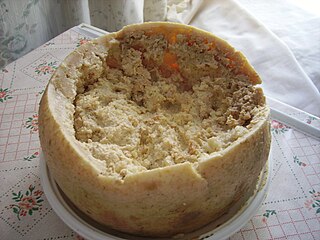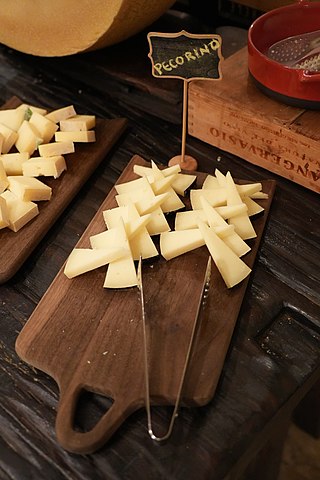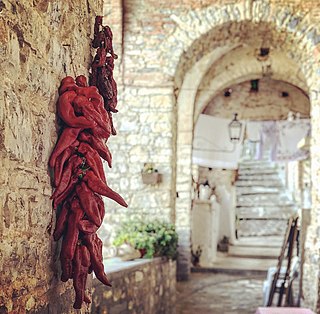Pecorino may refer to:
- Pecorino, hard Italian cheeses made from sheep's milk
- Pecorino (grape), white Italian wine grape variety
- Emanuele Pecorino (born 2001), Italian professional footballer
Pecorino may refer to:
Catalan may refer to:

Pecorino romano is a hard, salty Italian cheese, often used for grating, made with sheep's milk. The name pecorino simply means "ovine" or "of sheep" in Italian; the name of the cheese, although protected, is a simple description rather than a brand: "[formaggio] pecorino romano" is simply "sheep's [cheese] of Rome".

Casu martzu, sometimes spelled casu marzu, and also called casu modde, casu cundídu and casu fràzigu in Sardinian, is a traditional Sardinian sheep milk cheese that contains live insect larvae (maggots).

Molise is a region of Southern Italy. Until 1963, it formed part of the region of Abruzzi e Molise together with Abruzzo. The split, which did not become effective until 1970, makes Molise the newest region in Italy. Covering 4,438 square kilometres (1,714 sq mi), it is the second smallest region in the country, after the Aosta Valley, and has a population of 313,348.

Pecorino cheeses are hard Italian cheeses made from sheep's milk. The name "pecorino" derives from pecora, which means "sheep" in Italian.
Romani may refer to:
Locatelli is a Lombard surname.

Verdicchio is a white Italian wine grape variety grown primarily in the Marche region of central Italy. The name Verdicchio derives from verde and refers to the slight green/yellow hue that wines made from the grape can have.
Romano may refer to:

Controguerra is a town and comune in Teramo province in the Abruzzo region of central Italy.
Onifai is a comune (municipality) in the Province of Nuoro in the Italian region of Sardinia, located about 200 kilometres (120 mi) north of Cagliari, about 40 kilometres (25 mi) east of Nuoro and just 5 kilometres (3 mi) inland from the gulf of Orosei. The economy is based on agriculture and shepherding. Onifai is well known for its pecorino cheese and vernaccia wine made with Cannonau grapes. As of 31 December 2004, it had a population of 765 and an area of 43.0 square kilometres (16.6 sq mi).
Latino or Latinos refers to:
Pecora is a group of hoofed mammals that comprises most of the ruminants.
Sardo is a hard, grating cow's milk cheese that is similar to Pecorino Romano.

Pecorino is a white Italian wine grape variety that grows in the Marche, Abruzzo, Tuscany, Umbria and Lazio regions of Italy. Ampelographers believe that the grape is likely native to Marche, where the soil destined for this cultivation increases every year. This grape variety is used to produce the DOCG wines, like the Offida Pecorino DOCG, and the DOC wines, like the Falerio dei Colli Ascolani, the Colli Maceratesi and the Falerio dei Colli Ascolani.
Falerio dei Colli Ascolani is a denominazione di origine controllata white wine that is located in the region of Marche, in Italy. The DOC was created in 1975.
Verdicchio is the name or synonym of several wine and grape varieties including:
Rabiosa may refer to:
Emanuele Pecorino is an Italian professional footballer who plays as a striker for Serie B club Südtirol, on loan from Juventus.

The cuisine of Basilicata, or Lucanian cuisine, is the cuisine of the Basilicata region of Italy. It is mainly based on the use of pork and sheep meat, legumes, cereals and vegetables, with the addition of aromas such as hot peppers, powdered raw peppers and horseradish. The local gastronomy is, for historical-cultural reasons, typically peasant, based on simple recipes and on the culture of reuse, in particular of meat and bread.